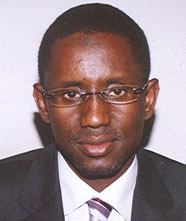
In late May, I did a post about the Jefferson scandal - where money was discovered in a freezer - that was allegedly "earmarked" for the Vice President of Nigeria, Abubakar Atiku.
At the time, Vice President Atiku stated "that Jefferson was name dropping and obviously committing a 419 (Nigerian Penal Code for Advance Fee) scam."
For anyone that is unfamiliar with advance fee (419):
"Nigeria is one of main sources for all sorts of Advance fee fraud (419) fraud scams. The Advance Fee scam is where a ruse is used to get a victim to part with their money (nowadays normally via wire-transfer) in anticipation of riches (or sometimes love) to come. The best known is the "Nigerian Letter," but the activity has mutated into romance, lottery, auction, check cashing, work at home and reshipping scams."
I also wondered in the post, whether or not, the EFCC (Economic Financial Crimes Commission) would investigate further. Apparently, they did with assistance from the FBI.
Brian Ross of ABC news is reporting:
Acting on information provided by the FBI, Nigerian fraud investigators have now indicted Vice President Atiku Abubakar on 14 counts of corruption, involving tens of millions of dollars allegedly diverted from government accounts.
According to Nuhu Ribadu, head of a new anti-corruption squad created by Nigeria's president, $23 million of the diverted money is still missing. Ribadu said $6.7 million of the missing funds has been traced to a U.S. company tied to Congressman Jefferson's family.
Link to Brian Ross story, here.
Meanwhile both Congressman Jefferson and Vice-President Atiku still deny everything and Mr. Jefferson -- who is running for re-election -- has yet to be charged.
In the original AP story, two of Jefferson's associates have been found guilty of bribery and admitted giving Jefferson other money to bribe African officials. The story also reports some pretty "damning" statements Jefferson made while being taped without his knowledge.
I wonder if and when he (Jefferson) will be charged - $90,000.00 in a freezer is a little hard to explain - even if it is a drop in the bucket when compared to the 6.7 million alleged by the Nigerian investigation.
The EFCC site has a lot of coverage (from a Nigerian perspective) on Mr. Atiku's woes.
Sadly enough - Congressman Jefferson is leading in the polls:
Congressman Jefferson Race Gets National Eyes And New Orleans Ayes
Of note - Jefferson has lost the support of the Louisiana Democratic Party, which seems a wise move on their part.
Nigerian fraud is legendary on the Internet - and the EFCC has had a lot of success in "taking a bite" out of it. Here is a picture of Nuhu Ribadhu, who is in charge of the EFCC and managed the Nigerian part of this investigation:

Since most fraud today has a global reach, some might argue the EFCC is stopping people from being victimized, worldwide.
You can view Mr. Ribadhu's biography, here.
